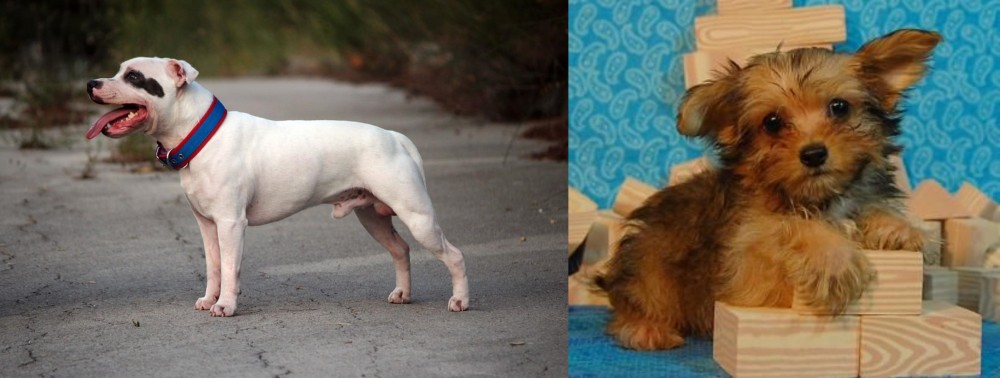 Staffordshire Bull Terrier is originated from United Kingdom but Yorkillon is originated from United States. Staffordshire Bull Terrier may grow 18 cm / 8 inches higher than Yorkillon. Staffordshire Bull Terrier may weigh 13 kg / 29 pounds more than Yorkillon. Both Staffordshire Bull Terrier and Yorkillon has almost same life span. Both Staffordshire Bull Terrier and Yorkillon has almost same litter size. Staffordshire Bull Terrier requires Low Maintenance. But Yorkillon requires Moderate Maintenance
Staffordshire Bull Terrier is originated from United Kingdom but Yorkillon is originated from United States. Staffordshire Bull Terrier may grow 18 cm / 8 inches higher than Yorkillon. Staffordshire Bull Terrier may weigh 13 kg / 29 pounds more than Yorkillon. Both Staffordshire Bull Terrier and Yorkillon has almost same life span. Both Staffordshire Bull Terrier and Yorkillon has almost same litter size. Staffordshire Bull Terrier requires Low Maintenance. But Yorkillon requires Moderate Maintenance
Basic Information
undefined
United Kingdom
United States
Life Span:
12 - 15 Years
12 - 14 Years
Other Names:
bully, pit bull English Staffordshire Bull Terrier • Staffie • Staffy • Stafford • Staffordshire
Papa-ShirePapa-Shire • Papiyork • Yorkie Pap Papillon-Yorkshire Terrier Mix, Papillon-Yorkie Mix,
Colors Available:
black or blue, white, any shade of brindle or any shade of brindle with white, Red, or any one of these colours with white, fawn
White, brown and white, light brown/golden, dark brown/chocolate, black and brown, black
Coat:
Smooth, short and close
Straight, medium, fine fine, soft coat
Temperament:
Affectionate, Alert, Courageous, Curious, Friendly, Gentle, Independent, Intelligent, Loving, Playful, Responsive, Stubborn
Alert, Energetic, Friendly, Loving, Loyal, Playful
Grooming:
Low Maintenance
Moderate Maintenance
New Owners Friendly:
No
Yes
History
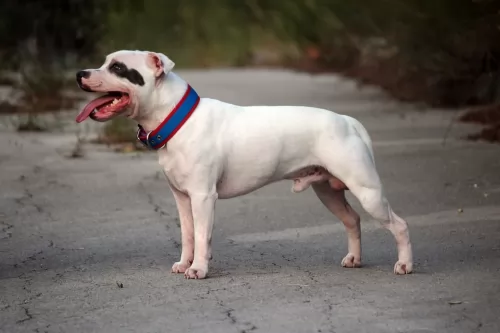 The Staffordshire Bull Terrier was first developed in the northern sections of Birmingham and in Staffordshire, England. The Staffie is a cross between a Black and Tan Terrie and the Bulldog, but had other breeds crossed in over time in order to create a bull-baiting dog and a fighting dog. In the Victorian age these sports were banned but dog fighting went underground and continues on some level today.
The Staffordshire Bull Terrier was first developed in the northern sections of Birmingham and in Staffordshire, England. The Staffie is a cross between a Black and Tan Terrie and the Bulldog, but had other breeds crossed in over time in order to create a bull-baiting dog and a fighting dog. In the Victorian age these sports were banned but dog fighting went underground and continues on some level today.
The Staffordshire Bull Terrier was exceptional at these “sports” due to his build, power and jaw strength. Today’s Staffie is a descendent of those early Bull Terrier crosses. Together with the Bull Terrier and the American Pit Bull, the Staffie also traces its roots back to those original English Bully dogs. All three breeds have the Bulldog in common.
After dog fighting and bull baiting were banned the Stafforshire Bull Terrier was further developed as a companion and pet. Still their reputation as fighting dogs cost them recognition in the official kennel clubs for some time. They finally made the UK registry in 1935, but it was not until 1974 that the American Kennel Club (AKC) accepted them.
The Yorkillon is a bighearted cross between the Yorkshire Terrier and the Papillon. They are small dogs with huge attitudes and big ears. They are known to be sassy and get into trouble. They are playful, affectionate and intelligent. They were initially developed in the US sometime about 20-30 years ago.
Not recognized by the American Kennel Club as they are considered designer dogs or mixed breeds
Description
Description
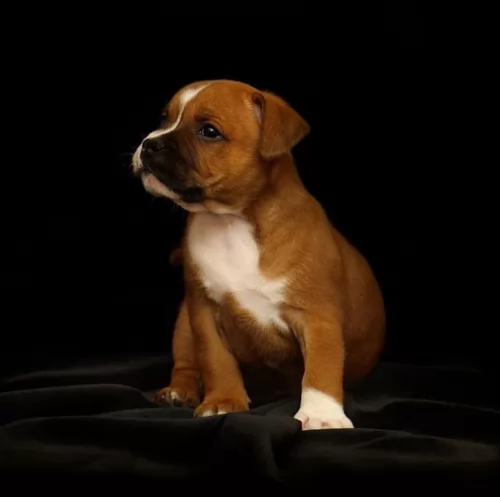 The Staffordshire is a muscular, stocky and unusually strong breed, small to medium size in height and build. They have broad, powerful chests, wide set, strong legs, strong shoulders, broad head with a fairly short muzzle. Their ears are not cropped but they are short and fold over. The coat is stiff, close and short and the tail is medium and carried low. Most Staffies are brown, but they can be red, brindle with white, fawn, black, white or blue.
The Staffordshire is a muscular, stocky and unusually strong breed, small to medium size in height and build. They have broad, powerful chests, wide set, strong legs, strong shoulders, broad head with a fairly short muzzle. Their ears are not cropped but they are short and fold over. The coat is stiff, close and short and the tail is medium and carried low. Most Staffies are brown, but they can be red, brindle with white, fawn, black, white or blue.
The Yorkillon is a small dog that can look like a Yorkie or a Papillon but most due have large ears like the Papillon. Both parent breeds have long hair and short legs. There is still a lot of first generation breeding, but most are now products of multigenerational breeding. This means that every puppy can look different and no two are likely to look the same.
Characteristics
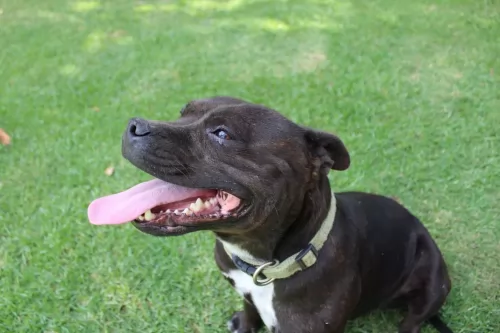 1.Children friendliness The breed adores children but care should still be taken because they are so strong and their jaws are so powerful.
1.Children friendliness The breed adores children but care should still be taken because they are so strong and their jaws are so powerful.
2.Special talents they adore children and they one of the most powerful jaws among canines.
3.Adaptability they need exercise and space, they are not apartment dogs.
4.Learning ability very smart, but very stubborn
1.Children friendliness yes but be careful the children do not hurt the small dogs. This is particularly true regarding the risk of tracheal collapse.
2.Special talents – loves to do tricks
3.Adaptability – can live anywhere in an apartment as well as a home, but he would prefer to have a fenced yard to run in.
4.Learning ability – extremely smart and very obedient
Health Problems
The breed is basically healthy, but they do have some hereditary health issues.
- Hip and elbow dysplasia- can cause arthritis.
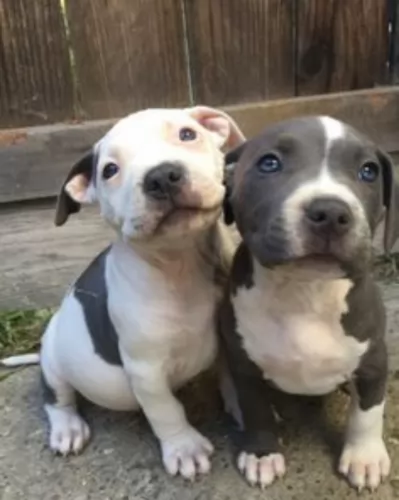 • Patella luxation otherwise known as a slipped kneecap- can cause pain and some lameness.
• Patella luxation otherwise known as a slipped kneecap- can cause pain and some lameness.
• Skin allergies and even a tendency toward Mange which is chronic in some forms and fatal in others.
- Heat issues and breathing issues due to their short, compressed faces.
• Like most active dogs their size, they are susceptible to bloat which can be fatal if not treated immediately.
There are not a lot of hereditary health issues but there are some issues they can be prone to:
• Patellar Luxation – slipped knee caps can lead to lameness.
• Epilepsy – can be treated with medication.
• Diabetes – can be treated with medication
• Legg Calve Perthes Disease – blood disorder affecting hind leg bones.
• Heart defects
• Tracheal collapse
• Hip dysplasia – can cause lameness.
Caring The Pet
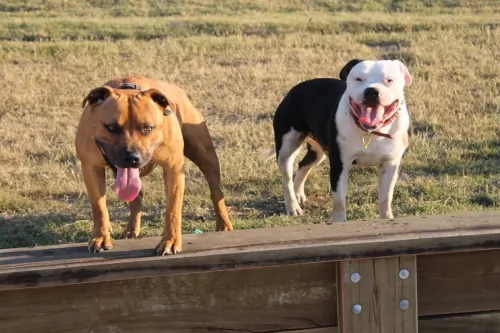 1.Feeding the puppy Don’t over feed as he grows fast. Feed a high quality dog food for medium size puppies. Feed 1-2 and a quarter cups in 3-4 meals per day.
1.Feeding the puppy Don’t over feed as he grows fast. Feed a high quality dog food for medium size puppies. Feed 1-2 and a quarter cups in 3-4 meals per day.
2.Feeding the adult Don’t exercise right before or after eating due to potential for bloat. Feed 1-2 times a day a high quality medium breed dog food.
3.Points for Good Health immense strength and power.
4. Games and Exercises They are terriers after all and they dig. Need a fairly large yard with a strong fence. They love to play ball, frisbee and can excel at cart pulling.
1.Feeding the puppy Feed a high quality toy puppy food 3-4 meals per day a total of ¼ cup for the day.
2.Feeding the adult Feed a high quality toy puppy food 1-2 meals per day a total of ½ cup for the day.
3.Points for Good Health – No inherited issues.
4. Games and Exercises – These are high energy dogs as both parent breeds are such. They need to run, love having a fenced yard, 15-20 minute walks per day.
Comparison with other breeds
- Yorkillon vs English Bulldog - Breed Comparison
- Yorkillon vs German Shepherd - Breed Comparison
- Yorkillon vs Golden Retriever - Breed Comparison
- Yorkillon vs Labrador Retriever - Breed Comparison
- Yorkillon vs West Highland White Terrier - Breed Comparison
- Yorkillon vs French Bulldog - Breed Comparison
- Yorkillon vs Beagle - Breed Comparison
- Yorkillon vs Yorkshire Terrier - Breed Comparison
- Yorkillon vs Poodle - Breed Comparison
- Yorkillon vs Rottweiler - Breed Comparison
- Yorkillon vs Boxer - Breed Comparison
- Yorkillon vs English Pointer - Breed Comparison
- Yorkillon vs Siberian Husky - Breed Comparison
- Yorkillon vs Doberman Pinscher - Breed Comparison
- Yorkillon vs American Bully - Breed Comparison
- Yorkillon vs Abruzzenhund - Breed Comparison
- Yorkillon vs Affenpinscher - Breed Comparison
- Yorkillon vs Afghan Hound - Breed Comparison
- Yorkillon vs Aidi - Breed Comparison
- Yorkillon vs Airedale Terrier - Breed Comparison
- Yorkillon vs Akbash Dog - Breed Comparison
- Yorkillon vs Akita - Breed Comparison
- Yorkillon vs Africanis - Breed Comparison
- Yorkillon vs Askal - Breed Comparison
- Yorkillon vs Atlas Terrier - Breed Comparison
- Staffordshire Bull Terrier vs English Bulldog - Breed Comparison
- Staffordshire Bull Terrier vs German Shepherd - Breed Comparison
- Staffordshire Bull Terrier vs Golden Retriever - Breed Comparison
- Staffordshire Bull Terrier vs Labrador Retriever - Breed Comparison
- Staffordshire Bull Terrier vs West Highland White Terrier - Breed Comparison
- Staffordshire Bull Terrier vs French Bulldog - Breed Comparison
- Staffordshire Bull Terrier vs Beagle - Breed Comparison
- Staffordshire Bull Terrier vs Yorkshire Terrier - Breed Comparison
- Staffordshire Bull Terrier vs Poodle - Breed Comparison
- Staffordshire Bull Terrier vs Rottweiler - Breed Comparison
- Staffordshire Bull Terrier vs Boxer - Breed Comparison
- Staffordshire Bull Terrier vs English Pointer - Breed Comparison
- Staffordshire Bull Terrier vs Siberian Husky - Breed Comparison
- Staffordshire Bull Terrier vs Doberman Pinscher - Breed Comparison
- Staffordshire Bull Terrier vs American Bully - Breed Comparison
- Staffordshire Bull Terrier vs Abruzzenhund - Breed Comparison
- Staffordshire Bull Terrier vs Affenpinscher - Breed Comparison
- Staffordshire Bull Terrier vs Afghan Hound - Breed Comparison
- Staffordshire Bull Terrier vs Aidi - Breed Comparison
- Staffordshire Bull Terrier vs Airedale Terrier - Breed Comparison
- Staffordshire Bull Terrier vs Akbash Dog - Breed Comparison
- Staffordshire Bull Terrier vs Akita - Breed Comparison
- Staffordshire Bull Terrier vs Africanis - Breed Comparison
- Staffordshire Bull Terrier vs Askal - Breed Comparison
- Staffordshire Bull Terrier vs Atlas Terrier - Breed Comparison
 Petzlover
Petzlover Staffordshire Bull Terrier is originated from United Kingdom but Yorkillon is originated from United States. Staffordshire Bull Terrier may grow 18 cm / 8 inches higher than Yorkillon. Staffordshire Bull Terrier may weigh 13 kg / 29 pounds more than Yorkillon. Both Staffordshire Bull Terrier and Yorkillon has almost same life span. Both Staffordshire Bull Terrier and Yorkillon has almost same litter size. Staffordshire Bull Terrier requires Low Maintenance. But Yorkillon requires Moderate Maintenance
Staffordshire Bull Terrier is originated from United Kingdom but Yorkillon is originated from United States. Staffordshire Bull Terrier may grow 18 cm / 8 inches higher than Yorkillon. Staffordshire Bull Terrier may weigh 13 kg / 29 pounds more than Yorkillon. Both Staffordshire Bull Terrier and Yorkillon has almost same life span. Both Staffordshire Bull Terrier and Yorkillon has almost same litter size. Staffordshire Bull Terrier requires Low Maintenance. But Yorkillon requires Moderate Maintenance The Staffordshire Bull Terrier was first developed in the northern sections of Birmingham and in Staffordshire, England. The Staffie is a cross between a Black and Tan Terrie and the Bulldog, but had other breeds crossed in over time in order to create a bull-baiting dog and a fighting dog. In the Victorian age these sports were banned but dog fighting went underground and continues on some level today.
The Staffordshire Bull Terrier was first developed in the northern sections of Birmingham and in Staffordshire, England. The Staffie is a cross between a Black and Tan Terrie and the Bulldog, but had other breeds crossed in over time in order to create a bull-baiting dog and a fighting dog. In the Victorian age these sports were banned but dog fighting went underground and continues on some level today. The Staffordshire is a muscular, stocky and unusually strong breed, small to medium size in height and build. They have broad, powerful chests, wide set, strong legs, strong shoulders, broad head with a fairly short muzzle. Their ears are not cropped but they are short and fold over. The coat is stiff, close and short and the tail is medium and carried low. Most Staffies are brown, but they can be red, brindle with white, fawn, black, white or blue.
The Staffordshire is a muscular, stocky and unusually strong breed, small to medium size in height and build. They have broad, powerful chests, wide set, strong legs, strong shoulders, broad head with a fairly short muzzle. Their ears are not cropped but they are short and fold over. The coat is stiff, close and short and the tail is medium and carried low. Most Staffies are brown, but they can be red, brindle with white, fawn, black, white or blue. 1.Children friendliness The breed adores children but care should still be taken because they are so strong and their jaws are so powerful.
1.Children friendliness The breed adores children but care should still be taken because they are so strong and their jaws are so powerful. • Patella luxation otherwise known as a slipped kneecap- can cause pain and some lameness.
• Patella luxation otherwise known as a slipped kneecap- can cause pain and some lameness. 1.Feeding the puppy Don’t over feed as he grows fast. Feed a high quality dog food for medium size puppies. Feed 1-2 and a quarter cups in 3-4 meals per day.
1.Feeding the puppy Don’t over feed as he grows fast. Feed a high quality dog food for medium size puppies. Feed 1-2 and a quarter cups in 3-4 meals per day.